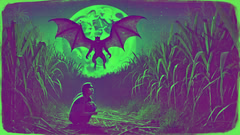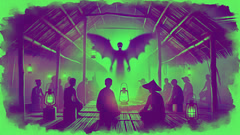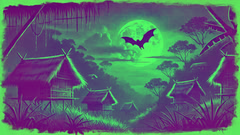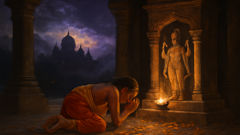Introduction
In the heart of the Visayan countryside, where the sugarcane fields sway beneath an endless indigo sky and the air is thick with the perfume of wild ylang-ylang, there are legends that breathe with the land itself. In this world of rolling hills and bamboo huts, where every dusk brings a chorus of cicadas and every dawn is painted with gold, the line between the living and the supernatural is drawn thin as a spider’s thread. This is a land carved by monsoon rains, where families gather close at night, whispering old stories as protection against the things that lurk in the shadows. Among all these tales—told in a hush around flickering oil lamps—none chills the blood more than that of the Manananggal, a creature of ancient hunger, whispered about in every village from Iloilo to Capiz. The Manananggal is no ordinary monster; it’s a woman by day, beautiful and unassuming, but at night she splits her body in two, sprouting bat-like wings and gliding through the moonlit skies, searching for her prey. It is said she craves the hearts of unborn children and the livers of the young, her tongue long and thin as a whip, slipping through thatched roofs to taste the warmth of life. In the minds of the people, the Manananggal is both a warning and a curse—a reminder that beauty can mask horror, and that some darknesses can never be tamed. This legend is not just a story; it’s a mirror reflecting fears as old as the archipelago, fears born from the jungles and the silent, waiting nights. For Lila, the farmer’s daughter with the spirit of a hawk, the tale of the Manananggal was always a shiver at the edge of a dream. She’d grown up with the warnings: keep garlic and salt by the windows, stay indoors when the moon is full, and never trust a stranger who asks too many questions. But legends have a way of becoming real, especially when the shadows begin to move just beyond the edge of the lamplight. And in the summer of 1872, as famine threatened and the villagers clung to hope with bloodied hands, something began to hunt in the darkness. Something that left nothing behind but torn banana leaves and the scent of iron on the wind. It is here, in this uneasy twilight between faith and fear, that Lila’s story begins—a story of courage, sacrifice, and a terror that wears a human face until the moon sets it free.
Whispers in the Sugarcane
Lila first noticed the change in the air during a dusk that seemed slower and heavier than usual. The fields behind her family’s hut had always been a place of comfort—a patchwork of sugarcane, coconut trees, and tangled wildflowers where she’d roamed as a child. But tonight, the air tasted of copper, and the cicadas fell silent in a way that made her skin prickle. She stood at the edge of the clearing, her skirt brushing against dew-laden grass, watching as the sky bruised itself into violet and the last light clung to the distant hills.

Her younger brother Tomas darted past her, arms outstretched, pretending to be a great bird. Their mother, Leonora, called them inside, her voice thin with exhaustion. The village had been tense for weeks. Three nights before, old Apong Mateo’s goat had been found dead, its insides gone, body splayed like a warning. Whispers grew like mold: some said wild dogs, others blamed witches from the next barrio. But Lila had seen the marks—deep, precise wounds, as if something sharp and hungry had found its way into the world.
Inside their nipa hut, the family gathered around the hearth. Garlic hung in thick braids near the window, and bowls of coarse salt lined every sill. Lila’s grandmother, Lola Ising, muttered prayers under her breath, fingers working a rosary with frantic devotion. It was Lola who spoke the words everyone feared: “Manananggal.”
Tomas shrank closer to his mother. Lila met her grandmother’s gaze. “Isn’t that just an old story?” she asked, her voice steadier than she felt. Lola shook her head, her eyes clouded with memories. “When the moon is full, she comes. She hunts the helpless. When I was a girl, we lost two children to her hunger. We salted our doors and lit fires, but still she came.”
Lila tried to sleep that night, but every creak of bamboo, every shift in the wind, seemed to carry the promise of wings. The village elders doubled their patrols, carrying bolos and torches, but fear was a poison that seeped into every home. The second night brought more horror: Tiya Remedios, pregnant with her first child, woke screaming, clutching her swollen belly. The midwife, pale and trembling, found two small punctures near her navel and a thin line of blood snaking across the bedsheets. Panic swept through the barrio. Some families fled to relatives farther inland; others prayed louder, burning incense and chanting Latin rites. The priest from the next town came to bless the fields, sprinkling holy water on doorways, but every shadow seemed to stretch longer, every gust of wind a possible omen.
Lila’s father, Pedro, tried to keep calm. He gathered the men each night, forming a circle of vigilance around the village. But even he was not immune to dread. Lila saw it in his eyes—a haunted, sleepless look that had never been there before. One morning, she found him sharpening his bolo by the fire, his hands shaking as he hummed a hymn to San Miguel.
On the third night, Lila couldn’t ignore her curiosity—or her fear. She crept from her mat after midnight, slipping outside into a world glazed with dew and moonlight. She followed the edge of the sugarcane fields, heart pounding, convinced that if she saw the Manananggal with her own eyes, the story would lose its power over her. The air was thick with silence. As she reached a stand of banana trees, she caught a movement—a flash of something pale and sinuous weaving through the leaves. Lila froze. Above her, a strange shadow glided against the moon, impossibly thin and wide-winged, silent as a wisp of smoke. She pressed herself to the earth, eyes wide, and watched as the thing circled the village once, then swooped low over her neighbor’s hut. There was a fluttering, a strange gurgling sound, and then the shadow was gone, leaving only a faint trace of blood on the ground.
Lila crawled back home at dawn, shaking and breathless. She knew, now, what she’d seen was no animal. The old legends were true. The Manananggal had come for them—and she was just beginning to understand the depths of its hunger.
The Severed Night
Word of the attacks spread beyond the village. By market day, even traders from the next province spoke of monstrous wings in the night and women with split bodies. Lila listened in secret as neighbors speculated about curses, jealous spirits, and old sins returned for vengeance. Yet beneath all the rumors, a name kept surfacing: Aling Rosa. She was a midwife, a healer with a reputation for strange herbs and solitary habits, living on the outskirts where forest met field. Some called her a witch; others said she’d lost her husband and child to fever, and that grief had twisted her soul.

That afternoon, Lila’s father was summoned by the village elders. They’d found another victim: a young carabao calf, its insides hollowed out in the same manner as before. Pedro returned home pale and grim. “We must act tonight,” he told his family. “The elders believe we must confront whatever evil stalks us—no more hiding.”
The plan was simple but desperate: they would set a trap near Aling Rosa’s hut. The men would hide among the trees with torches and knives, while the priest waited inside, armed with holy water and prayers. Lila begged to join them, but her father refused. “This is not for you,” he said. But Lila, stubborn as always, slipped away after dusk, determined to see the truth with her own eyes.
Hidden among the bamboo thickets, Lila watched as torches flickered against the night. The village men shifted nervously, their weapons glinting in the firelight. Midnight came, thick with mist. Suddenly, a wind rose, cold and unnatural. From within Aling Rosa’s hut came a strange sound—a guttural moan, followed by a tearing noise like cloth ripped apart. The door burst open. Something monstrous crawled out: the upper half of a woman, her intestines trailing behind, skin stretched tight over jutting bones, eyes glowing with hunger. Bat-like wings erupted from her back, beating against the air with a sickening hiss. The lower half of her body—legs and hips—remained behind, propped against the wall like a discarded husk.
The men shouted and rushed forward, but the creature lifted itself skyward with terrifying speed. The priest hurled holy water; it sizzled where it landed, forcing the Manananggal to shriek and veer away. In the chaos, Lila caught a glimpse of Aling Rosa’s face—contorted in agony, yet unmistakably human beneath the monstrous features. The truth crashed over her: the Manananggal was not just a beast. It was someone cursed, someone who had once belonged to the village.
The crowd panicked. Some fled; others swung their bolos at shadows. The Manananggal circled above, searching for an opening. Then, with a howl of fury, it dove toward Lila, drawn by her scent or perhaps by some instinct deeper than hunger. She fell back, scrambling for safety, but the priest intervened, brandishing his crucifix. The creature recoiled and vanished into the forest.
By dawn, the village was divided. Some wanted to burn Aling Rosa’s hut and salt the earth; others wept for the woman they’d known, refusing to believe she’d become such a monster. Lila, shaken but determined, visited the hut once more. Inside, she found a battered journal and a bundle of dried herbs. The journal’s pages told a story of grief—how Rosa had begged the spirits to bring back her lost child, how something answered her prayers with a promise and a curse. The last entry was a plea: "Forgive me. I cannot stop what I have become."
That night, Lila understood that fighting the Manananggal was not just about knives and garlic. It was about hope, forgiveness, and facing the darkness within as much as without. As the moon rose full once more, she resolved to end the curse—not only for her village, but for Aling Rosa herself.
Conclusion
The summer drew to its close with the monsoon rains, washing blood and memory from the earth but never fully erasing what had been witnessed. The villagers buried their dead and honored their wounded, yet the old stories no longer felt like distant warnings—they were part of life now, stitched into the soul of the land. Lila kept Aling Rosa’s journal hidden beneath her mat, its pages a reminder of both terror and mercy. She knew the Manananggal’s curse could return if grief or anger twisted another soul beyond breaking. Still, the village grew stronger: garlic hung heavier in every home, children learned new prayers, and each full moon brought both dread and unity. For Lila, the memory of that terrible flight would never fade, but neither would her courage. She became a keeper of stories, passing on not just fear but wisdom: that monsters are made by pain as much as by darkness, and that hope shines brightest when the night is at its blackest. The legend of the Manananggal lived on—not just as a tale to frighten children, but as a lesson about love, loss, and the endless battle between light and shadow beneath the Philippine sky.













